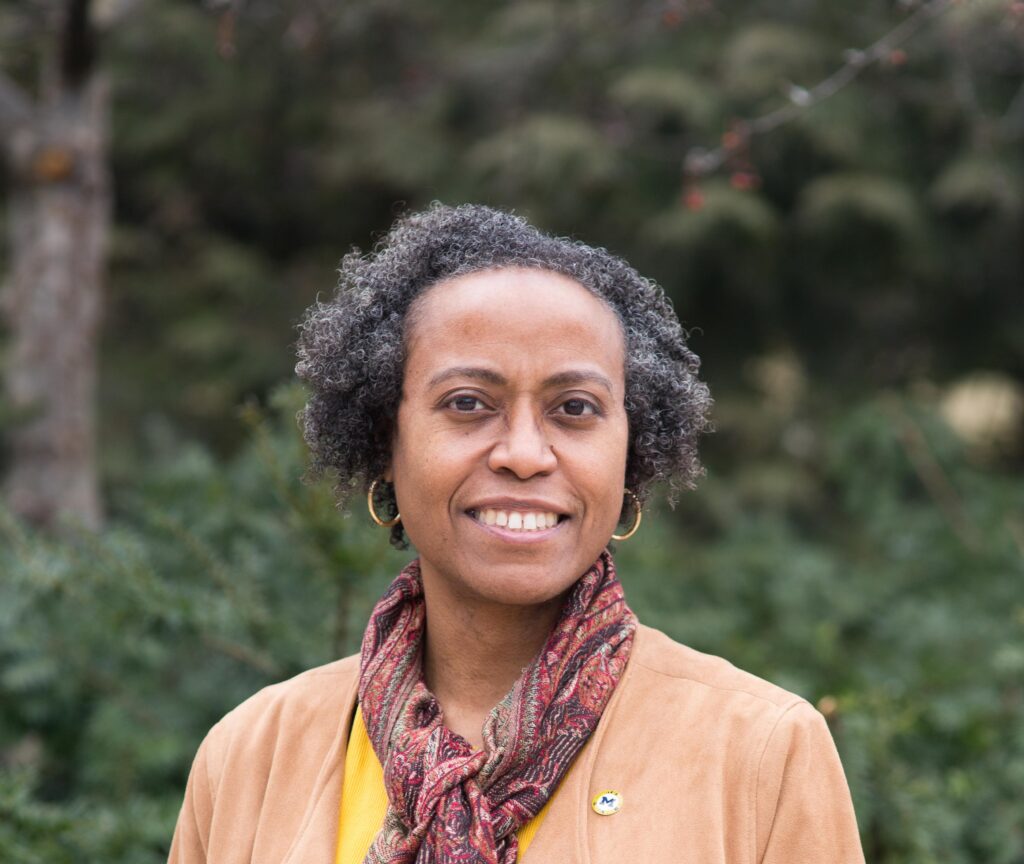Source: Michigan News
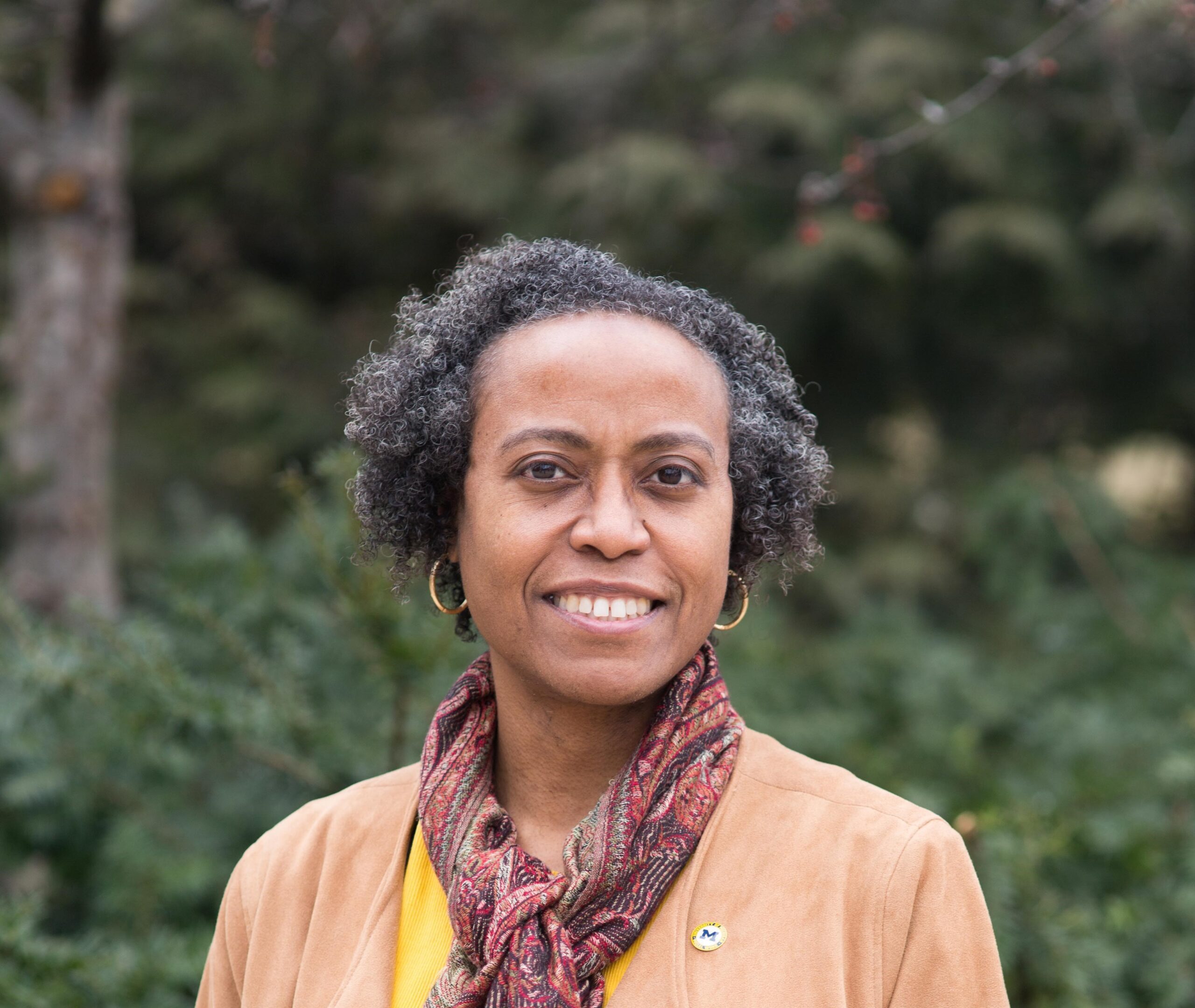
Trina Shanks, social work professor at the University of Michigan, director of the Center for Equitable Family and Community Well-Being, faculty associate at the Institute for Social Research, and director of community engagement at the School of Social Work.
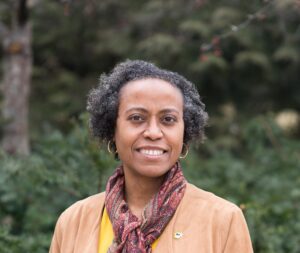
Trina Shanks, social work professor at the University of Michigan, director of the Center for Equitable Family and Community Well-Being, faculty associate at the Institute for Social Research, and director of community engagement at the School of Social Work.
In the nearly 20 years that University of Michigan social work professor Trina Shanks has lived in Detroit and researched issues related to the impact of poverty, she’s gotten much closer to solutions.
Shanks, director of the Center for Equitable Family and Community Well-Being, faculty associate at the Institute for Social Research and director of community engagement at the School of Social Work, has conducted research on the impact of poverty and wealth on child well-being; asset-building policy and practice across the life cycle; and community and economic development.
She spent 10 years working on the Skillman Foundation’s Good Neighborhoods Initiative, which was a $100 million effort to improve outcomes for children in Detroit.
As a faculty affiliated with the Technical Assistance Center funded by the Skillman Foundation, Shanks was actively engaged over a 10-year period in six Detroit communities as part of the Good Neighborhoods program. She also has conducted multiple evaluations of Detroit’s Summer Youth Employment Program—Grow Detroit’s Young Talent.
Tell me about your work in the Center for Equitable Family and Community Well-Being. How did that come about?
Based on some grants I already had, and then some match money from the School of Social Work, I got a small bit of seed funding to start the center. Of course, to keep it going I have to raise additional money. But at least we had a little pot of money to say, “If we wanted to have equitable partnerships with community partners, community-based organizations, community residents, how would you like to get that done?” I hired one program manager, who’s a former student. We did some strategic planning. About a year ago, we started the center.
We give out small grants. We focus on improving economic well-being for local families and communities by partnering to implement ideas that might lead to greater equity at more systemic levels.The small grants offer community members and groups an opportunity to apply for funding to test new services, take on additional projects and do things they would not otherwise be able to do. Such small grants will establish a track record of working with the School of Social Work and ideally could lead to other projects and research collaborations.
One of our small grant recipients was able to provide support to various communities in Detroit during the beginning of the COVID-19 pandemic. They were able to ensure families were provided with hand sanitizer and toilet paper during the height of the pandemic when finding those items was nearly impossible. They were also forward thinking and used some of the funds to provide school supplies to families swiftly transitioning to our new reality of online learning. Finally, for those who are in schools physically, this recipient was able to provide backpacks for those who needed them.
The goal of our center is to encourage and support win-win efforts by connecting the resources of the University of Michigan with the passion and social capital of community leaders. Most importantly, families and communities are intentionally at the heart of the work.
You’ve done a lot of research on child savings accounts. Why are these so important, particularly in underrepresented communities?
I’ve been looking at what some people call the racial wealth gap. What really happens is Black and Latinx households at some point, have had net worth as low as 5 cents on the dollar compared to white households. It may be closer to 10 to 12 cents on the dollar today with all the changes going on in the world. Typically someone asked, “Well, why is that?”
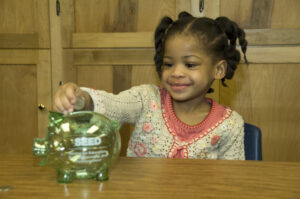
A student in the Head Start program in Pontiac learning about savings as part of the MI-SEED, or Saving for Education Entrepreneurship and Downpayment. Shanks was involved with the policy demonstration program in Michigan around child savings accounts from 2004 to 2009.
People have all preconceived notions and may have all sorts of thoughts about that. I had tried to answer that question in some of my own research. After a while, I’m like, “You know what, I don’t wanna argue about why it exists and whether the cause is more historical racism or current practice and policies.” It’s probably a combination of the two. Right. I said, “I’d really prefer to be part of the conversation about concrete changes that can make a difference in helping people to thrive and improve life chances for all people, particularly those facing economic hardship.”
The niche I moved it on—actually I should provide one step more. There was a different policy agenda around what’s called individual development accounts. It was an intervention that gained traction and federal funding for a demonstration in the late 1990s where low-income families were given match dollars for what they saved for a home, a business, schooling or, in some sites, retirement.
The next iteration of this idea conceived by Michael Sherraden (my dissertation co-chair and alumni of the School of Social Work joint doctoral program) was child savings accounts. From 2004 to 2009, I worked as part of the SEED (Saving for Education Entrepreneurship and Downpayment) policy demonstration program in Michigan around child savings accounts.
Rather than waiting for someone to be economically disadvantaged, below the poverty line, and trying to figure how to intervene in adulthood, what are things you can do early on, or from birth, that will actually deal with two problems. One, educational disparities and helping young people get prepared for educational success and raising educational expectations.
Then, secondly also thinking broadly about reducing racial wealth gaps and improving financial capability as well. To me, those two are married with child development accounts. You actually help people launch educationally, but you also provide a foundation financially in the family and then for the child. That’s why I think child development accounts are great. The other thing around equity issues is that every state has what’s called a 529 plan, which is the college savings plan written within the federal tax code. Some state programs are more equitable than others, but all of them are primarily utilized by and skewed towards the wealthy.
In addition to points I mentioned about child development accounts improving educational equity and building a foundation for financial capability, with child development accounts you actually have the possibility of reducing those state sponsored, if you will, inequities federally supported by the tax code by taking what used to be inequitable structures and broadening them, and making them for everybody. You wanna take something that has been exclusive and make it for everybody. Universal, and progressive, and helping those who are most disadvantaged as opposed to those who are already well off.
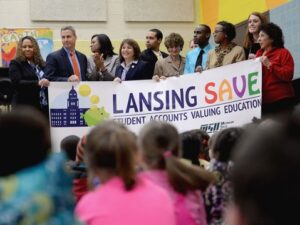
Shanks, third from right, at the Lansing SAVE launch in January 2015.
When you were working with the Skillman Foundation in six Detroit communities for the Good Neighborhoods program, what were some of the ways that Detroit residents benefited?
Well, the nice thing about the Good Neighbors program is that Skillman made $100 million investment in six neighborhoods over 10 years (and eventually increased to $120 million). For those six neighborhoods, there were large community meetings where residents and nonprofit leaders communicated together and came up with a plan about what they wanted to see in their neighborhoods, what they wanted their goal to be, how they wanted those dollars invested. For those six neighborhoods, they had direct investment in their communities.
We were part of what was called the Leadership Academy. We took young people and adults and community leaders and trained them in leadership. Many of them continued to lead in their communities, sometimes within Good Neighborhoods, sometimes at other positions. Those people, even after Good Neighborhoods had ended, have that training, those networks and are still engaging and working in Detroit and in their wider community. They are still working to improve high school graduation rates, increase the quality of after-school programming and meet the needs of local residents throughout the city. They now have a voice and a platform and the community self-efficacy that comes from past success.
You’re also active in work that aims to reverse extreme economic inequality. What are some of the solutions and ongoing challenges you’ve recognized through your work in Detroit?
I guess the big thing is the grand challenge to reduce extreme economic inequality is a national social work movement that comes through the American Academy of Social Work and Research. I’m one of the co-leads. I think the most exciting aspect of this moment is that the things we’ve been recommending over the last five years are literally some of the same things that are being discussed in these emergency aid packages right now in Washington. Things like child allowances and having a steady stream of either universal basic income or tax credits that go to low-income families, expanding employment—unemployment insurance or employment security.
What’s another one that’s in there? Expanding child care. If child development accounts become part of the conversation at some point, extending asset building policies and achieving what we call inclusive asset building.
The point is that they seemed pie in the sky before the pandemic, but now that we’ve had this pandemic and some of the inequities that existed become more apparent, these ideas are actually becoming part of state and federal policy.
In the two decades you’ve been in Detroit, I wonder what changes you have seen? Has all the money that’s been spent by foundations and universities, and individuals made things better?
When I first came here, to say there was despair is probably going a bit too far. There was a sense of no one cares about Detroit, no one invests in Detroit, it’s so hard, funding is scarce, we’re fighting against one another. You have to be really dedicated or won’t get anything out of it. That was the storyline. We went through changes in mayors, recessions and foreclosures, and even bankruptcy.
On the other end, partly because we successfully went through bankruptcy and we’ve had foundations and others saying, “We still believe in Detroit.” People are now saying, “Well, maybe it’s not so bad, and maybe it’s worth investing in.” On the ground people started saying, “You know what? Rather than watching other people do things to and for us, we want to be part of this conversation ourselves.”
I think that changed the dynamic from despair-ish to hopefulness-ish. I’ve been working as part of an advisory committee for Co.Act. It’s funded by Ralph C. Wilson. Ralph C. Wilson created Co.Act to build the capacity of the civic sector and nonprofits in Detroit. Again, going from everybody fighting against one another for limited pots of money, they’ve at least provided a place and the infrastructure and some funding that if you wanna work together and collaborate on important issues for the city, it is possible to find new sources to make it happen.
Through Co.Act and other new philanthropic efforts, there are options to fund community-based nonprofits directly as opposed to going through intermediaries like often happened in the past. I was part of the funding advisory board and the selection team for the first round of grants through Co.Act. It was just really exciting. We had 200 applications and 110 of them got funded.
Even the ones that didn’t get funded are part of the infrastructure, they’re being assisted, and worked with, and helped to get to the next level. That just wasn’t happening definitely not collaboratively, but that large number, particularly of the newish organizations just wouldn’t have been part of the conversation in the past. Just being able to be part of that and seeing it happen and—you know what, this is maybe not a completely new day. With the pandemic, there were obviously setbacks, but different people at the table and there are increasing spots of equity.
You worked on the internal committee that looked at how the university should engage in Detroit. How has the university’s approach to Detroit changed?
One of the first things we did was talk about principles for engagement. Those principles are now the principles recommended by the university. Now, obviously everybody might not understand them or follow them completely, but at least there is a stated best practice, if you will. I think that’s important. Then, there is now a Detroit Advisory Group. The university is still very decentralized. Our approach has been “let a thousand flowers bloom.” But there are increasing opportunities to collaborate across units.
There are at least opportunities to meet one another, collaborate with one another, advise larger groups of people who are doing engagement, and who are working in Detroit, and who are thinking about working in Detroit. It doesn’t have to be everybody starting from scratch completely every time.
It’s not perfect yet but it’s better than it was, and I think people are communicating. That’s good. There are these larger projects like the work happening on the Marygrove campus. If you’re interested in doing things around cradle to career, pre-K through college education, or serving in the Livernois-Six Mile area, you can go talk to the folks at Marygrove and be plugged into something in that community, as opposed to completely starting from scratch. If someone is interested in working in areas around public health, you can go and talk to Barbara Israel and connect to her collaborative Urban Research Center partners, and ask, “Where can I plug into this?”
The Ginsberg Center, Poverty Solutions. MICHR are other places to learn what others are doing in Detroit and find support.
That there are opportunities to plug in when people want to, or at least places to go to ask questions if you’re considering starting something new in the city is progress.

